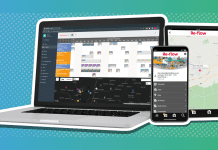If your GPS tracking system helped you take on more work each week – and if overtime payments could be reduced by several hours – what would your return be per employee?
With many vehicles, drivers and sites to manage in the planning and construction industry, a popular tool for improving workforce productivity is GPS tracking. But what makes a good tracking system?
The right tracking system won’t just tell you where your vehicles are, it will provide information that is directly relevant to your business operations. It will help you to manage and allocate your vehicles, improve productivity and to keep your employees safe.
The following points will help you to choose a robust GPS tracking system with the most valuable and relevant reporting capabilities.
Which reports will I need to improve productivity and operating costs?
A tracking system that produces accurate timesheets teamed with late site arrival and early departure alerts will reduce undue overtime claims and ensure your customers are billed for the correct hours of work. This insight not only validates hours worked, it also enables you to bid smartly on new projects.
If the tracking system offers APIs, you can feed all these valuable reports into your own business systems, including payroll, freeing employees to focus on the job and not on paperwork.
“It’s great for us, because we’ve done away with timesheets. Our employees don’t need to do the paperwork; we use the daily email reports to log their hours on site and calculate wages from that. The system definitely saves us money,” says Pauline Brett, office manager of Ellenby Construction.
The data should be accessible by any team, with the ability to drill down into individuals or groups of drivers and create custom reports. In the construction industry, managers are often out of the office, so it’s also useful if reports can also be accessed via email and on a mobile device.
Which reports can identify actions needed to lower fuel costs?
To help your drivers become more fuel efficient, you must know how your vehicles are being driven. Mileage and fuel usage reports are important to gauge the fuel efficiency of your fleet. Geofencing alerts to flag unauthorised journeys and unwarranted use of company fuel will help you to drive those costs down, plus reports that assess daily routes, driving styles and acceleration and braking metrics.
Helping a driver to improve their driving style can lower fuel costs significantly; maintaining a good driving score has been shown to reduce fuel consumption by up to 25% (Frost and Sullivan, 2015).
What other fleet insights can help reduce costly overheads?
Real-time vehicle utilisation reports ensure fewer vehicles are out of action and reduce unnecessary costs. Keeping your fleet on the road will increase your capacity to complete projects. Some tracking systems will allow you to set up vehicle MOT, service and maintenance reminders, ensuring any vehicle downtime can be planned effectively.
A good tracking system will help you plan, react and validate. As Matt O’Conner, managing director of John O’Conner Grounds Maintenance describes: “Vehicle tracking lets you take control of your fleet, improve operational efficiency and manage costs, safety and time.”
One feature to look out for is the ability to identify your nearest vehicle to a postcode, so that you can best deal with urgent requests in real-time.
How will a GPS tracking system support my drivers and improve their safety?
Planning and construction contracting is competitive, and it’s critical to keep operational costs low and ensure quotes are competitive to help your company grow. The conduct and safety of your organisation’s drivers on the roads are also a vital aspect of your brand’s reputation. Share these motivations with your workforce and encourage them to embrace GPS tracking.
A system that produces league tables and driving style scores can provide a basis for incentive schemes, eg for exemplary driving behaviour, most improved driving style or most work completed on time.
Drivers can sometimes be given access to their own tracking data and driving scores via a system’s mobile app. This can provide useful feedback on their daily trips, letting them take control of their own progress.
If your employees travel long distances to work sites, a system that details journey lengths and times will help to ensure that staff are getting adequate rest. With the safeguarding of a good tracking system, your teams will also be well covered when subject to false claims about their driving or punctuality on site.
How can I justify the investment in GPS tracking?
With Quartix vehicle tracking, short-term and rolling contracts offer you optimum flexibility – should your number of vehicles change, you aren’t tied in for several years. If you have a fleet of 40-plus vehicles, special rates and longer-term contracts are also an option.
To put the potential savings into perspective, ask yourself this: If a GPS system helped my company to take on more work each week, and if overtime payments could be reduced by several hours, what would the return be per employee?
It’s not hard to see how a small monthly payment can lead to a large return per driver.
If you then focused on driving styles and eliminated private usage to reduce fuel consumption by, say, 70 litres per month… we’ll leave you to do the maths.
To learn how Quartix can help your construction business visit www.quartix.net, email enquiries@quartix.net, or call 01686 807 607.
Tel: 01686 807 607
Twitter: Quartix
Please note: this is a commercial profile.

















